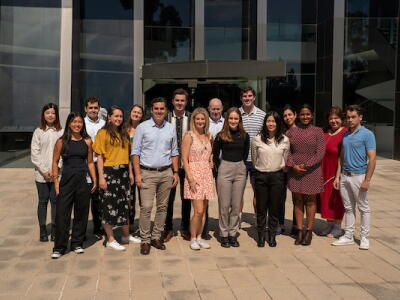Major ANU funding win to boost health for all Australians
Posted on
A tobacco-free future and stopping cancers caused by infections are two of the exciting projects at The Australian National University (ANU) to receive major funding from the Australian government.
Five ANU researchers have won more than $10.7 million from the National Health and Medical Research Council (NHMRC) Investigator Grant scheme to help tackle some of the biggest medical and health challenges.
Announced today by the Minister for Health and Aged Care, the Hon Mark Butler MP, the grants will empower ANU researchers to tackle chronic diseases caused by smoking, Alzheimer's and Multiple Sclerosis, cancer and heart attacks.
Professor Emily Banks will receive more than $2.9 million to drive improved tobacco and e-cigarette control and provide new insights into cardiovascular disease prevention.
"Smoking remains Australia's number one cause of premature death and disability," Professor Banks said.
"It is also a major cause of health inequity. Excellent progress by communities means that most Aboriginal and Torres Strait Islander people don't smoke. At the same time, around half of all deaths at age 45 and over in this priority population are due to tobacco smoking.
"Australia is aiming for a tobacco-free future and is up against a predatory industry that is constantly innovating. E-cigarettes, or vaping, also present new challenges.
"My team and I will use this funding to generate and translate new insights to empower the next generation of tobacco and e-cigarette control and chronic disease prevention. This includes creating microsimulation models to better understand and target prevention.
"I am extremely honoured and grateful to receive this funding to continue this vital work and the trust placed in me and my team by the minister and the government. We look forward to continuing to deliver research that improves health, nationally and internationally."
Deputy Vice-Chancellor (Research and Innovation) Professor Keith Nugent congratulated all the NHMRC Investigator Grant recipients on their funding success.
"As a trusted national research institution, ANU is committed to delivering tangible benefits to our nation on a daily basis," he said.
"This grant success is a strong indicator of our health research excellence and acknowledges the skill our researchers bring in pursuing vital work that will improve the lives and health of all Australians.
"I warmly congratulate our five exceptional researchers and look forward to following the progression of their ground-breaking and potentially life-saving health research."
Professor Mark Polizzotto will lead a project examining how to better treat cancers caused by infections thanks to more than $2.8 million in funding.
"One in five cancers worldwide are caused by infections," Professor Polizzotto said.
"This grant will continue my world-leading work in developing drugs to treat and prevent cancers caused by infections, and in understanding their origins.
"My team and I will focus on simple but effective drugs that can be used in developing countries, and to ensure my new treatments can be used by those in greatest need."
Other ANU researchers to win funding in the latest round of NHMRC Investigator Grants are:
Professor Thomas Preiss, who has received more than $2.4 million to investigate RNA-level gene regulation and how this impacts cardiac and cancer biology.
Professor Yuerui Lu, who has received more than $1.5 million to further develop micro-lenses he has invented, and which can be inserted into blood vessels to provide high-speed and real-time images that allow specialists to better understand the causes of heart attacks and how to prevent them.
Dr Ehsan Kheradpezhouh, who will receive more than $630,000 to investigate what mammals' neurons can teach us about Alzheimer's disease and Multiple Sclerosis, including better targeted treatments.
You may also like
$3m grant for biotech collaboration to develop new therapies
A collaborative research project involving scientists from the Clear Vision research lab at The Australian National University (ANU), and biotech company VivaZome Therapeutics, has been awarded a $3m…
